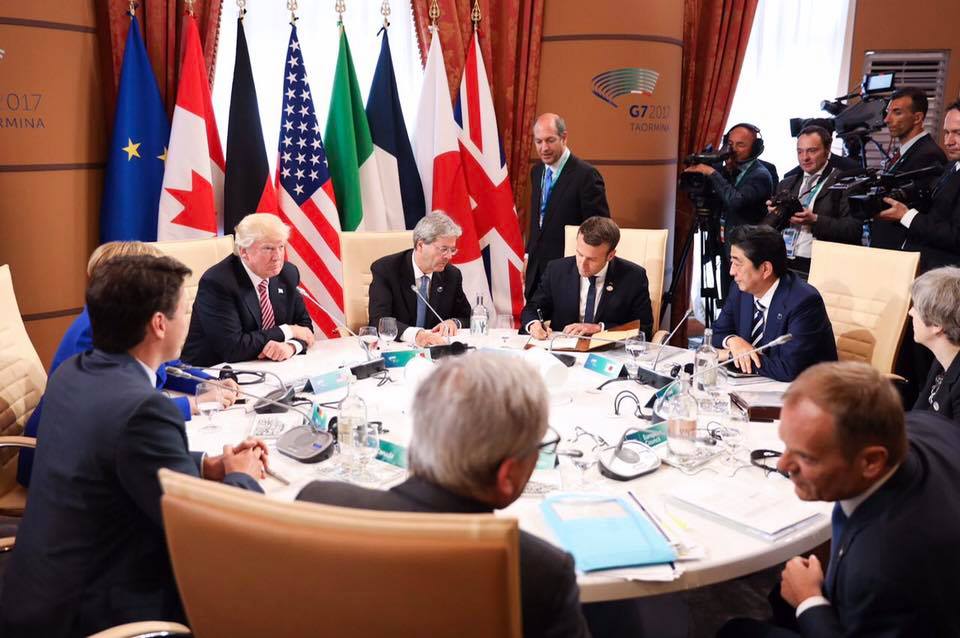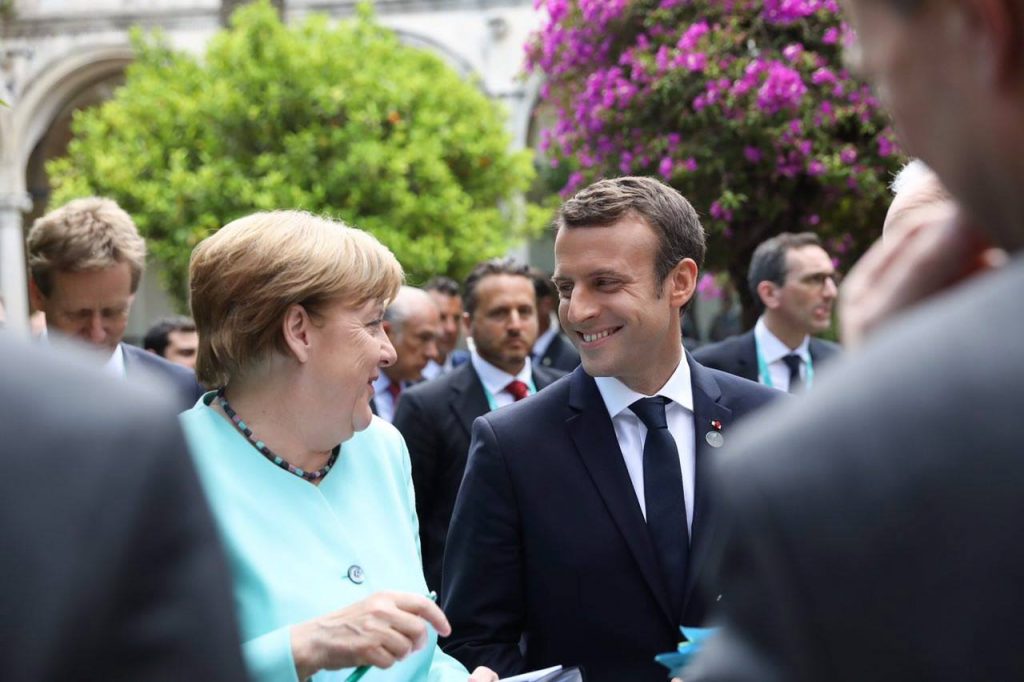PM Theresa May’s rethinking relationship with “game changer” French President
After an unexpected result at the General Election, Prime Minister Theresa May seems to rethink her priorities on foreign policy. The Conservative leader stated she was ready to get to work and has announced a trip to France to meet President Emmanuel Macron.
Analysts consider that May’s poor performance was the result of her disastrous campaign. However, the association with US President Donald Trump is also considered a contributing factor. May was the first foreign leader to visit Trump in the White House and has constantly been in contact with the US leader.
When PresidentTrump pulled out of the Paris climate deal, May came under fire for refusing to sign a letter from European leaders decrying Trump’s decision. Moreover, all the European leaders linked with Donald Trump have been affected and suffered a string of electoral disappointments.
Now, the US President Donald Trump put on hold his first official visit to the United Kingdom, and the British Prime Minister has changed focus and aims to resume older alliances with traditional European partners.
#Trump tells PM #TheresaMay he put his visit to the UK on hold – reports https://t.co/yVNqSAF5wO pic.twitter.com/DHYOra1YiR
— Sputnik (@SputnikInt) June 11, 2017
Downing Street has confirmed the PM’s first official engagement since the gamble on a snap election that weakened Britain’s position just days before formal Brexit talks. May has announced she will travel to France to meet with the country’s president Emmanuel Macron.
The Prime Minister is expected to urge the French President to support her call for an international agreement on tackling web giants over extremist content and hate crime.
The meeting follows pro-EU Emmanuel Macron’s En Marche! party’s landslide victory in the French parliamentary elections.
A symbolic meeting between two leaders of at the forefront of fighting terrorism
In a move that reminds of Germany’s Chancellor Angela Merkel, the British official is also expected to cheer on England’s football team that will play a friendly match, as a tribute to the victims of recent terror attacks in the UK.
@fhollande #Match amical de football #France–#Allemagne en présence de Mme Angela #MERKEL pic.twitter.com/QwqxV0hx
— Marie Farret ?? (@MarieFarret16) February 7, 2013
The two leaders will watch the friendly match between France and England friendly at the Stade De France, where the French are expected to honour the victims of the recent terror attacks in Manchester and London. Eight people were killed in an attack in London earlier this month, including three French nationals, while a suicide bomb attack at an Ariana Grande concert at Manchester Arena killed 22 people.
In addition to the minute’s silence, the English national anthem will be played after that of France, in a reversal of the usual protocol.
A similar tribute was paid at a friendly match that took place at Wembley in November 2015, just days after the terror attacks in Paris, when an armed gunman launched an attack at the Bataclan concert hall which left 130 people dead.
France has been on heightened security alert following a wave of attacks across the country over the last couple of years and the level of alert in the United Kingdom was raised in the wake of the recent terrorist attacks.
Emmanuel Macron’s victory is considered a „game changer” for the EU
Theresa May, Britain’s prime minister, will enter the Brexit negotiations significantly weakened after the UK general election. By contrast, Emmanuel Macron, France’s president, is projected to emerge from legislative elections with the definitive parliamentary majority that May was expecting when she called for a Snap election.
The first-round parliamentary election result promises President Emmanuel Macron a crushing majority in the Parliament. Despite one of the lowest voter turnout in France’s modern history, Macron’s La Republique en Marche and its MoDem ally are estimated to wind up with 70% of the seats, which would mark one of the biggest majorities in postwar France.
Meanwhile, Theresa May lost her majority in Parliament after conceding Conservative seats to both Labour and the Lib Dems, which has made the Brexit negotiations more difficult. The Conservative had to get more than 325 seats to obtain the majority but ended short of that total getting 318 MPs in the House of Commons.

Abroad, Macron has already made the first step to returning France to a leadership role in Europe and worldwide. He has expressed his disapproval regarding Donald Trump’s withdrawal from the Climate Agreement and is now the most retweeted person in history thanks to his „Make
Our Planet Great Again”. With less than a month in office, Macron also stood up to Russia President Vladimir Putin telling the Russian leader that the use of chemical weapons in Syria was a red line. The 39-year-old has also gained the support of German Chancellor Angela Merkel and Canadian Prime Minister Justin Trudeau.
At the same time, he announced his support for an EU military force. giving voice to fears across Europe that the United States can no longer be trusted to come to the aid of any NATO ally.
His strong response to the latest terrorist incident at Notre Dame Cathedral also suggests that he is capable of managing France’s most acute problems, terrorism.
Macron’s campaign manifesto for the revival of France has the European Union at the centre, but his vision could also have a lot to gain if Brexit proceeds uninterrupted.

With Britain out of the EU, there is a serious chance of restarting the Franco-German alliance that traditionally the European project. Moreover, in a recent speech, Angela Merkel suggested that the UK and the US were no longer reliable partner and lauded the need for co-operation with France.
France aims to attract UK business after Brexit
The opportunities for France are economic as much as political. If Britain excludes itself from the EU single market, France has a significant chance to win over jobs in finance and manufacturing
Since the Brexit vote, Paris has been running an aggressive campaign to poach jobs from London. Stuart Gulliver, HSBC’s chief executive, said the bank would shift 1,000 investment banking jobs to the city, but the French campaign has had few other successes.
US banks including Bank of America, Citigroup and Morgan Stanley are among the groups being urged to choose Paris over rival European financial centres, according to people briefed on the discussions.
This is one of the reasons why a „hard” Brexit could suit France since it would ensure that London lost its “passport” to do euro-related business and would also disrupt supply chains for British manufacturers.
BlackRock, the world’s largest asset manager, which employs more than 2,000 people in London, is also in talks with French officials, who claim Macron’s presidential victory is a “game-changer”.
US banks that use London as their European hub are preparing to shift business elsewhere. The UK’s looming departure from the EU threatens to strip them of the “passporting” rights that allow them to seamlessly operate across the bloc from the City. Several American bankers said time may be running out for Paris to get banks to set up new operations in time for Britain’s scheduled departure from the EU in 2019.
Airbus has already warned that jobs may leave Britain, if the UK leaves the EU’s internal market, and France could well be the beneficiary.
All of this means that President Macron has little economic or political incentive to make concessions on migration or money, to make it easier for Britain to choose a “soft Brexit”.